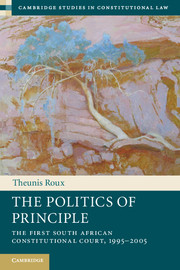Book contents
- Frontmatter
- Contents
- Acknowledgements
- Introduction
- Part I Problematic, Theory, Methodology
- Part II Context
- 4 The political context for judicial review, 1995–2005
- 5 Constraints and opportunities: The law/politics distinction in South African legal-professional culture
- Part III Thematic Case Studies
- Conclusion
- Bibliography
- Index
- References
5 - Constraints and opportunities: The law/politics distinction in South African legal-professional culture
Published online by Cambridge University Press: 05 April 2013
- Frontmatter
- Contents
- Acknowledgements
- Introduction
- Part I Problematic, Theory, Methodology
- Part II Context
- 4 The political context for judicial review, 1995–2005
- 5 Constraints and opportunities: The law/politics distinction in South African legal-professional culture
- Part III Thematic Case Studies
- Conclusion
- Bibliography
- Index
- References
Summary
Throughout the process of colonial state formation and the rise and fall of apartheid, the legal profession in South Africa remained strongly attached to an idea of law as separate from politics. For the most part, this attachment was driven by narrow class and race interests. The dominant legal-professional view of law in South Africa before 1994 was thus a crude form of positivism that originated in the profession's self-serving need to distance itself from the injustices of white minority rule. There was, however, also an oppositional tradition that made a profound contribution to the struggle against apartheid. The adherents of this tradition maintained a sincere and tenacious faith in law as a form of anti-politics – in the capacity of law to act as a bulwark against the abuse of political power.
Many of the members of the Chaskalson Court, in their previous work as practising lawyers and judges, had been leading exponents of this tradition, and all of them embraced its fundamental premises. They would thus have been predisposed to see the transition to liberal constitutionalism both as a conclusive vindication of their view of law and as a mandate to act on it. This predisposition would have been reinforced by the political context in which the Court found itself and also by the institutional form of the post-apartheid Constitutions. Founded as it was on the separation of powers, the Court's role under the post-apartheid Constitutions would have seemed to the judges to require them to sustain the law/politics distinction as a necessary precondition for the Court's independence.
- Type
- Chapter
- Information
- The Politics of PrincipleThe First South African Constitutional Court, 1995–2005, pp. 191 - 232Publisher: Cambridge University PressPrint publication year: 2013

